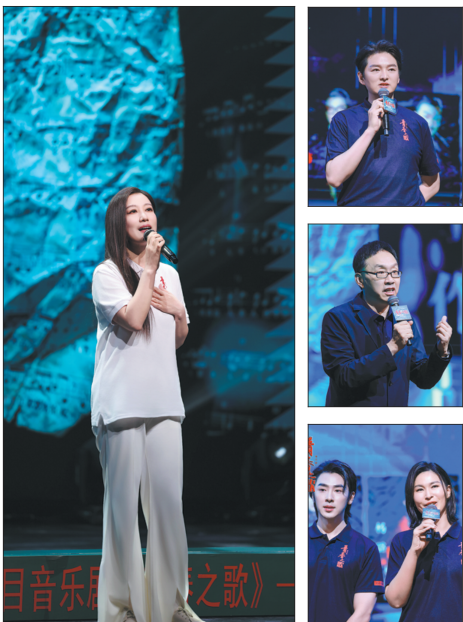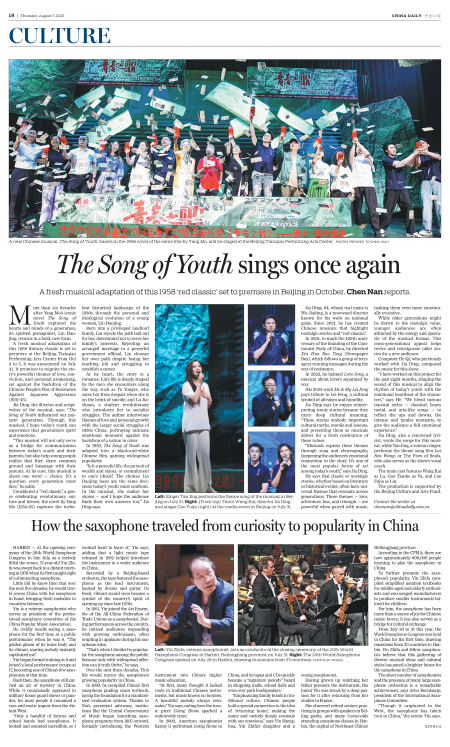
A new Chinese musical, The Song of Youth, based on the 1958 novel of the same title by Yang Mo, will be staged at the Beijing Tianqiao Performing Arts Center.

Left: Singer Tan Jing performs the theme song of the musical in Beijing on July 31. Right: (From top) Tenor Wang Kai, director Jia Ding and singer Cao Fujia (right) at the media event in Beijing on July 31.
More than six decades after Yang Mo's iconic novel The Song of Youth captured the hearts and minds of a generation, its spirited protagonist, Lin Daojing, returns in a bold, new form.
A fresh musical adaptation of this 1958 literary classic is set to premiere at the Beijing Tianqiao Performing Arts Center from Oct 3 to 5, it was announced on July 31. It promises to reignite the story's powerful themes of love, conviction, and personal awakening, set against the backdrop of the Chinese People's War of Resistance Against Japanese Aggression (1931-45).
Jia Ding, the director and scriptwriter of the musical, says: "The Song of Youth influenced our parents' generation. Through this musical, I hope today's youth can experience that generation's spirit and emotions.
"This musical will not only serve as a bridge for communication between today's youth and their parents, but also help young people realize that they share common ground and language with their parents. At its core, this musical is about one word — choice. It's a question every generation must face," he adds.
Considered a "red classic", a genre celebrating revolutionary culture and heroes, the novel by Yang Mo (1914-95) captures the turbulent historical landscape of the 1930s through the personal and ideological evolution of a young woman, Lin Daojing.
Born into a privileged landlord family, Lin rejects the path laid out for her, determined not to serve her family's interests. Rejecting an arranged marriage to a powerful government official, Lin chooses her own path despite losing her teaching job and struggling to establish a career.
At its heart, the story is a romance. Lin's life is deeply shaped by the men she encounters along the way, such as Yu Yongze, who saves her from despair when she is on the brink of suicide, and Lu Jiachuan, a student revolutionary who introduces her to socialist struggles. The author intertwines themes of love and personal growth with the larger social struggles of 1930s China, portraying intimate emotional moments against the backdrop of a nation in crisis.
In 1959, The Song of Youth was adapted into a black-and-white Chinese film, gaining widespread popularity.
"Is it a peaceful life, the pursuit of wealth and status, or commitment to one's ideals? The choices Lin Daojing faces are the same decisions today's youth must confront. In the musical, she makes her choice — and I hope the audience finds their own answers too," Jia Ding says.
Jia Ding, 64, whose real name is Wu Jiading, is a renowned director known for his work on national galas. Since 2021, he has created Chinese musicals that highlight nostalgic stories and "red classics".
In 2021, to mark the 100th anniversary of the founding of the Communist Party of China, he directed Xin Hua Bao Tong (Newspaper Boy), which follows a group of teenagers running messages during the war of resistance.
In 2023, he helmed Love Song, a musical about lovers separated by war.
His 2024 work Me & My Lei Feng pays tribute to Lei Feng, a cultural symbol of altruism and humility.
Jia Ding says he enjoys reinterpreting iconic stories because they carry deep cultural meaning. "These stories embody important cultural myths, morals and lessons, and presenting them as musicals allows for a fresh celebration of these values.
"Musicals express these themes through song and choreography, deepening the audience's emotional connection to the story. It's one of the most popular forms of art among today's youth," says Jia Ding.
He says that classic or nostalgic stories, whether based on literature or historical events, often have universal themes that resonate across generations. These themes — love, adventure, loss, and triumph — are powerful when paired with music, making them even more emotionally evocative.
While older generations might be drawn to the nostalgic value, younger audiences are often attracted by the energy and spectacle of the musical format. This cross-generational appeal helps revive and reinvigorate older stories for a new audience.
Composer He Qi, who previously worked with Jia Ding, composed the music for this show.
"I have worked on this project for the past eight months, shaping the sound of this musical to align the rhythm of today's youth with the emotional heartbeat of the characters," says He. "We blend various musical styles — classical, heavy metal, and aria-like songs — to reflect the ups and downs, the intense and tender moments, to give the audience a full emotional experience."
Jia Ding, also a renowned lyricist, wrote the songs for this musical, while Tan Jing, a veteran singer, performs the theme song Ren Lai Ren Wang, or The Flow of Souls, who also serves as the show's vocal coach.
The main cast features Wang Kai as Lu, Gao Tianhe as Yu, and Cao Fujia as Lin.
The production is supported by the Beijing Culture and Arts Fund.
Contact the writer at chennan@chinadaily.com.cn

